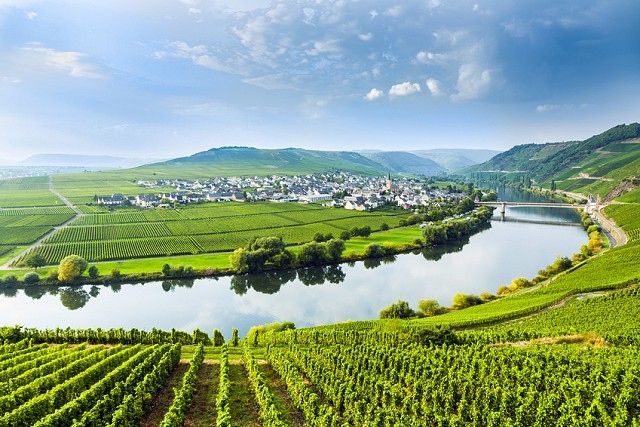Hock!
Date published: 22 February 2014

Vines are planted along the steep embankments of the rivers in Germany
Once the toast of the Victorians and especially Queen Victoria, German wine has seen demise since the turn of the twentieth century. So what has driven us away from this classic wine?
Wine was made in Germany as far back as 100 B.C. introduced by the Romans. They saw the potential in the steep slopes of the Rhine and Mosel rivers. Queen Victoria visited the region in 1845, such was her love for German wine. It was in the Rheinghau region she termed the phrase 'Hock' for German wine, short for Hockheim. There is still a vineyard their named in her honour 'Königin Victoriaberg'.
This was as big as German wine would get in this country. The success of their wines around the world encouraged the Germans to produce more grapes at cheaper costs. Introducing more prolific but poorer quality grapes like Muller Thurghau (think Liebfraumilch!) and planting on the flat land which was less than optimum for wine quality.
This sweet/off dry diluted mass produced wine is what hit our supermarkets back in the sixties and seventies leaving us all with a bad taste in our mouth.
But do not over look this region. It still offers some of the best wines in the world. The secret is understanding the wine label.
German wine is not graded by quality regions or Premier Cru, Grand Cru rather it is ranked by sweetness. The most planted grape is Riesling, one of the most expressive wines in the world. It is planted in many countries and indeed Australia has some fantastic Rieslings but are completely different to Germany's Riesling.
These grapes reflect the terroir from where they came. At this latitude most grapes would struggle to ripen. To ensure the vines get as much sun as possible they are planted along the steep embankments of the rivers grabbing every bit of sunlight they can and the rocky soil retaining the sun's heat and warming the grapes by night.
Because of these steep sloping faces the grapes must all be hand picked by very well trained staff. In fact, they may pick the same vine several times during the season, each time with varying degrees of ripeness for each different style of wine.
There are six classifications from the drier styles to lusciously sweet. Kabinett (a younger fresher style), Spatlese (late harvest), Auslese (select harvest), Beerenauslese (berry select harvest), Trockenbeerenauslese (dried berry select harvest) and finally Eiswein (ice wine).
If you are looking for a dry wine for seafood or fish look on the label for Trocken (German for 'dry'). This will only be found on a Kabinett wine. Another clue would be to look at the alcohol content. The higher the alcohol the drier the wine.
If, however, your taste is for something sweeter then this is where German excels. They offer everything from hints of honey with Auslese. Harvested two weeks after the Kabinett wine, the sugar content has started to increase giving a more full bodied off dry medium wine. Trockenbeerenauslese is incredibly difficult to collect and very unpredictable, relying on a very helpful fungus (botrytis) to envelop the grape giving a rich marmalade honey style wine but purely relies on this fungus deciding to work. These wines can commands hundreds of pounds per bottle.
Nothing comes easy in this region.
Eiswein is a little different, collected only around January when the weather has dipped below -8 degrees. The grapes freeze losing their water and concentrating the shrivelled mass that is left.
So there is some 'de-coding' to do but please don't be put off. Wine tastes have moved on from sweeter wines to dry style wines but a good quality Riesling will give you anything you want from a wine all in one country.
Give it a try.
In Vino Veritas.
Food & Wine by Paul Sheerin
Pshearse@gmail.com
Do you have a story for us?
Let us know by emailing news@rochdaleonline.co.uk
All contact will be treated in confidence.
Most Viewed News Stories
- 1Schools in Rochdale borough to become vape free settings
- 2Historic England ‘disappointed’ by the spat over Hopwood Hall
- 3Final phase of Rochdale Town Hall redevelopment tabled
- 4Consequences of impending landline switch off revealed in new survey
- 5Innovative wastewater management system deployed for Littleborough flood defence works
To contact the Rochdale Online news desk, email news@rochdaleonline.co.uk or visit our news submission page.
To get the latest news on your desktop or mobile, follow Rochdale Online on Twitter and Facebook.

